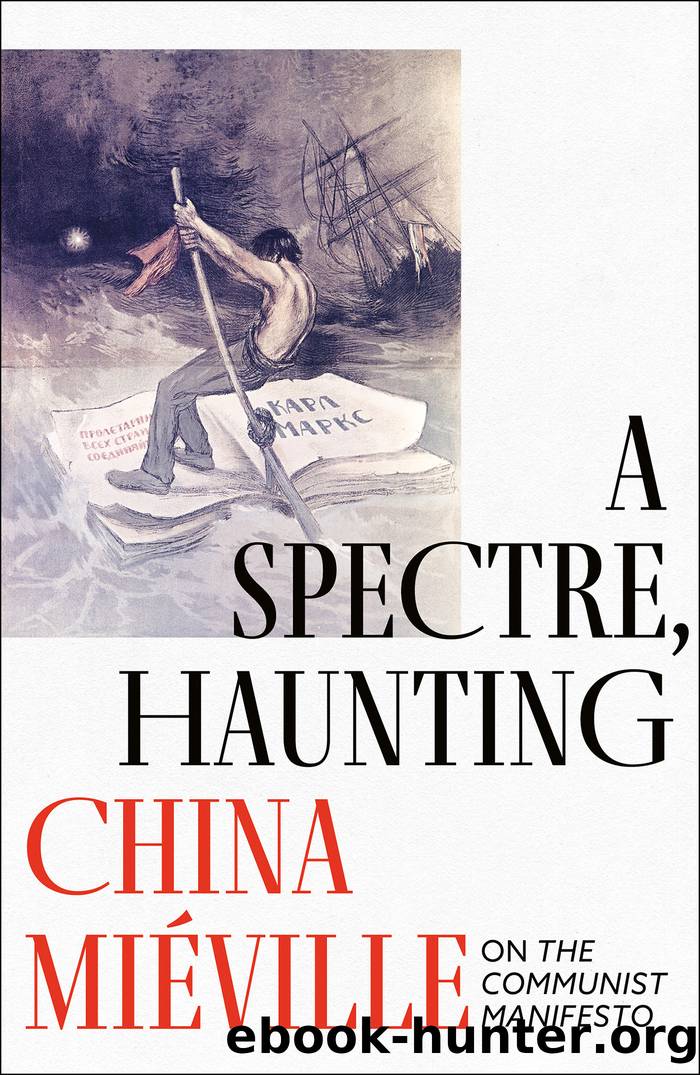A Spectre, Haunting by China Miville;

Author:China Miville; [Miéville, China]
Language: eng
Format: epub
ISBN: 9781786692023
Publisher: Vearsa
NEOLIBERALISM, ADAPTATION, UNIVERSALISM AND TENACITY
The iteration of capitalism that has defined the last four decades, neoliberalism, is characterised by a ruthless prioritisation of fast-moving financial and rentier capital, and a brutal intensification of class struggle â overwhelmingly one-sided in the ruling classâs favour â and exploitation. The neoliberal approach to capitalismâs complex balancing act with regard to capitalist realism, of judging how much reform to offer when, and how and when to insist that no change is possible, has been characterised by an aggressive campaign to collapse the boundaries of the possible, an ideology of eternal exploitation most vividly expressed in Margaret Thatcherâs notorious formulation: There is no alternative â TINA.
The TINA nostrum has recently come, to various extents, to be challenged. Though the anglophone Leftâs most exciting and vibrant projects for years â the Corbyn and Sanders campaigns in the UK and US â have been soundly defeated, the horizon of social possibility isnât quite so constrained as it recently was. Such questioning has also occurred from the other pole of politics, with the profound crisis into which the Covid-19 pandemic has pushed it, forcing capitalismâs partisans to hurriedly offer the kind of massive, systemic support they scoffed at as impossible scant weeks earlier. Itâs increasingly whispered that neoliberalism is over.
In fact, the chaotic jostling for strategy by the managers of global capitalism, particularly in the UK and US, have often represented an attempt to square neoliberalism with new realities. But the scale of transformation necessary in capitalismâs accumulation regime, in the new reality dictated by Covid in the context of weak underlying economies, is such that whatever shape of economy the British state (and others) cobble together will likely not be recognisable as the neoliberalism that has defined the last four decades.13 But even for those of us sickened by the system of brutality neoliberalism has installed, this in itself isnât ground for optimism. Thereâs no particular reason to hope that the most cruel specificities of recent capitalism will be lessened. They are at least as likely to be made worse.14
US capitalism, one of neoliberalismâs playgrounds, having grown without a mass reformist movement, a workersâ party or a welfare state, is unusual for the savagery of its exploitation among âadvancedâ countries. It has been resistant even to these social reforms that might stave off the social collapse or upheaval unconducive to capital accumulation. The country has been increasingly marked by the structural power of its short-termist and narrowly venal bourgeoisie, and, concomitantly, the overtly barbarous sadisms and vulgarities of its ideology. Along with which, of course, come its realities, such as its vicious, racialised, carceral regime, for example, with more (poor) people in jails than in any other country in recorded history.15 These arenât âimperfectionsâ or pathologies of late capitalism: they are its excrescences and symptoms. They bring advantages â in capitalâs terms â such as a weak working-class movement. But such structural rigidity comes with disadvantages, too. Cracks in the ideological edifice can have more shattering effects than they would in a more flexible version of capitalism, for example.
Download
This site does not store any files on its server. We only index and link to content provided by other sites. Please contact the content providers to delete copyright contents if any and email us, we'll remove relevant links or contents immediately.
| Anarchism | Communism & Socialism |
| Conservatism & Liberalism | Democracy |
| Fascism | Libertarianism |
| Nationalism | Radicalism |
| Utopian |
The Secret History by Donna Tartt(18267)
The Social Justice Warrior Handbook by Lisa De Pasquale(11969)
Thirteen Reasons Why by Jay Asher(8492)
This Is How You Lose Her by Junot Diaz(6476)
Weapons of Math Destruction by Cathy O'Neil(5872)
Zero to One by Peter Thiel(5517)
Beartown by Fredrik Backman(5386)
The Myth of the Strong Leader by Archie Brown(5255)
The Fire Next Time by James Baldwin(5042)
How Democracies Die by Steven Levitsky & Daniel Ziblatt(4978)
Promise Me, Dad by Joe Biden(4920)
Stone's Rules by Roger Stone(4881)
100 Deadly Skills by Clint Emerson(4712)
A Higher Loyalty: Truth, Lies, and Leadership by James Comey(4576)
Rise and Kill First by Ronen Bergman(4559)
Secrecy World by Jake Bernstein(4420)
The David Icke Guide to the Global Conspiracy (and how to end it) by David Icke(4416)
The Farm by Tom Rob Smith(4340)
The Doomsday Machine by Daniel Ellsberg(4263)
